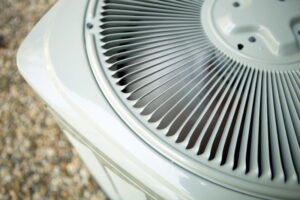When the summer is getting started and your home’s air conditioning system begins running on the regular, do you ever wonder if maybe it needs to have its refrigerant refilled or topped off? This is something people often think, but it’s based on a false assumption.
The simple answer is no, your AC will not need more refrigerant put into it during its service life—unless it’s a repair for a refrigerant leak. Our experts in air conditioning in Warner Robins, GA will explain more below.
Refrigerant Is Not a Fuel!
It’s easy to think of refrigerant as the energy source or the fuel that the AC runs on. But the air conditioner’s energy source is electricity. That’s what powers the components inside it. Refrigerant is a heat-transfer medium: it’s a blend of chemicals that can easily shift between liquid and gaseous states to move heat from inside a house to the outside. (In a heat pump, it can move heat in either direction).
As refrigerant goes through the process of condensing and evaporating, it doesn’t dissipate. The amount of refrigerant put into the AC when it’s installed (known as its charge) will remain at the same level and pressure for the full life of the air conditioner.
Refrigerant Leaks and Why They’re a Problem
There is one exception to this: an air conditioner may start to lose refrigerant because of leaks. Corrosion along refrigerant lines is the most common cause of a refrigerant losing its charge. This problem isn’t limited to aging ACs: some types of corrosion can begin to affect the refrigerant lines after only five years.
Loss of refrigerant is a major problem. Here’s why.
- Decreased cooling efficiency: Refrigerant is essential for your air conditioner to absorb and dissipate heat. When the refrigerant level is low, your AC can’t effectively cool your home, resulting in poor cooling and higher temperatures.
- Higher energy bills: With less refrigerant, your AC has to work harder and run longer to achieve the desired temperature. This extra effort increases energy consumption, leading to higher electricity bills.
- Potential compressor damage: The compressor, which pumps refrigerant through the system, is designed to operate with a specific refrigerant charge. Low refrigerant levels can cause the compressor to overheat and fail, resulting in expensive repairs or even the need for a complete AC replacement.
- System strain and wear: Running an air conditioner with a low refrigerant charge places additional strain on other components, accelerating wear and tear. This can lead to more frequent breakdowns and a shorter lifespan for your AC unit.
Restoring Refrigerant
You need HVAC technicians to repair refrigerant leaks. Only licensed professionals have the qualifications to handle refrigerants. Once the technicians have located and sealed the leaks, they will restore the lost refrigerant to your AC so it will return to its factory-set level. (It’s extremely important not to overcharge the AC, as too much refrigerant is as much a problem as too little.)
If you notice your AC is losing cooling power, turns on and off too rapidly, or is making strange bubbling or hissing noises, you may have an issue with leaking refrigerant. Don’t hesitate to call for repairs, because you don’t want refrigerant leaks to end up destroying the compressor.


